24º International Poetry Festival of Medellín
July 19th to 27th, 2014
“CELEBRATION OF EARTH WITH NATIVE PEOPLES"

Inauguration Medellin Internacional Poetry Festival
By Jairo Guzmán
Direction Committee Medellin Internacional Poetry Festival
With the 24th Medellín International Poetry Festival, held from July 19th to July 27th, 2014, the light became brighter which opens ways and enables us to see a promising, foundational horizon, with an open spirit enriched by the conjunction of the world’s different cultures which come into poetic harmony, with the effect of a collective mood sublimated into song and memory. READ MORE
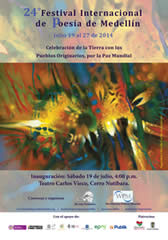
Two months after the inauguration of the 24th Medellin International Poetry Festival, we present to our readers a general program comprising 145 performing acts and participation of 73 poets from 39 countries. We invite you to disseminate it widely among their friends and in your social networks. READ MORE
World poetry meeting in Medellín:
146 acts for orbital peace and for Earth
A vigorous and multitudinous celebration of existence and of Earth, with aboriginal poets from the ancient Innu, Nahuatl, Mazatec, Muscogee, Quechua, Mapuche, Yanacona, Wayuu, Kamsá, Maya and Sami nations, accompanied by the Celebration of Earth with the Native Peoples forum; the Colombian Poetry, Art and Culture for Peace Forum; the performance of 146 acts for world peace; the performance of the 18th issue of the International Poetry School, and several sessions of the Coordinating Committee of the World Poetry Movement, are some of the main activities. LEER
Poetry: Light transformed into love of the planet

Painting by Carlos Jacanamijoy
Por Jairo Guzmán
Direction Committee of Medellin Poetry Festival
Poetry will give us the strength to return to humankind the “patrimony of light / transformed / into love of the things of this planet”, as expressed by Jorge Carrera Andrade in his memorable poem El combate poético.
Many are the urgent issues humankind needs to address in order to achieve permanence on Earth. Many are the signs that announce its extinction if it continues on the same path of destruction and servitude. READ
Biographical info about invited poets
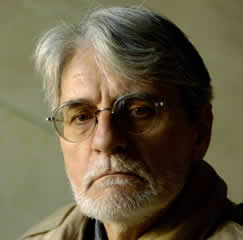
By Ivo Svetina
Two centuries ago Hölderlin wondered about the purpose of poets in those godforsaken times. The world was god-forsaken because the gods had deserted it, had fled away from man, who had pronounced himself the crown of creation, donned the cloak of the will to power, become arbitrary, self-sufficient, self-infatuated, a Narcissus who gazed at himself in the water surface as in a mirror, recognising himself, his imaginary beauty, as the supreme law. As the subject (sub-iectum) of everything, to everything. READ MORE
By David McKirdy
If our environment shapes us as people then the place in which we live must also inform our creative endeavours and shape us as poets, this has certainly been the case with my own writing. Hong Kong is frequently viewed and portrayed as the archetypal modern Asian city, with it's thrusting architectural vernacular which is the main fodder of the documentary, travelogue and infomercial. Like Italo Calvino's book 'Invisible Cities', Hong Kong is a different place to different demographic groups and even to different individuals within these same groups. READ MORE
David McKirdy to young poets: 'Don't look too far from home'
Roughshod Trickster
(Translator’s Afterword)
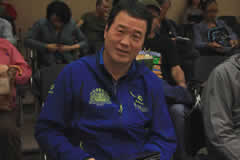
By Denis Mair
Prologue to Nine Nights
Ninth Night is a book-length poem documenting the poet’s effort to deal with the dilemmas of money and power during a period of chaotic growth in the Chinese economy. After a 20-year wild ride on the back of the corporate tiger, the poet begins to undergo extreme experiences of his own choosing (including mountain climbing), as a way of confronting history from his own authentic standpoint. This goes hand-in-hand with his growing attachment to a younger woman. The whole book is written in the form of animal parables, or what could better be termed animal dramatic monologues. READ MORE
Amin Khan, Poet of the crossing of the borders
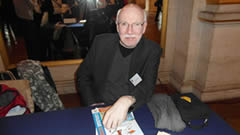
By René Depestre
I have the great pleasure to talk about Amin Khan, Algerian poet, at a time when the Arab and Islamic world is making a democratic breakthrough that is upsetting ideas and circumstances regarding justice, law, culture, and freedom. In North Africa and in the Middle East, the heirs of the Arab and Islamic civilization are showing that life in the Arab societies is not doomed to an existential stalemate where the woes, setbacks, and regressions of the 20th century would be endlessly repeated. Today the predatory political powers are everywhere facing youthful and popular dissent and renovation movements. READ MORE
The Rumpus Interview with Joy Harjo
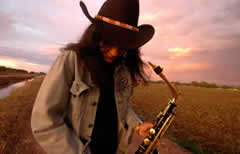
By Julie Morse
Joy Harjo is a craftswoman of poetry. Her poems are constructed with such precision and graceful narration that I don’t consider them to be mere poems, but sermons. She isn’t only a poet. Harjo’s a performer, professor, playwright, and musician with the band Poetic Justice, and recently a memoirist (her memoir Crazy Brave came out in July 2012 from Norton). She is the recipient of the National Endowment for the Arts fellowship, the PEN Open Book Award, and the American Indian Distinguished Achievement Award, among many other accolades. Through her art (and beyond), she’s an activist, pioneering for the recognition and respect of indigenous and writers of color within the realm of literature and academia. As a Native American of the Muskogee Creek Nation, she was born fighting for rights of indigenous peoples in her homeland of Oklahoma and throughout the country. READ MORE
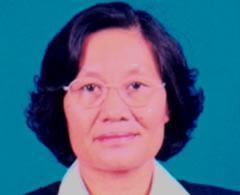
By Kongdeuane Nettavong
Special for Prometeo
Historically Laos was called the Land of a Million Elephants.
Everywhere there were forested mountains and people living in harmony with the natural world they were immersed in. Living in this way they learned from nature to think and imagine and to explain the world in harmony with the laws of nature.
So poetry was born there in the mind of the poet and transmitted orally in the form of both poems and Mo Lam. Mo Lam is a style of Lao singing in which the words change according to the intent of the singer, who may choose to tell a story or flirt or comment as appropriate to the situation. Everything they composed was rhythmic. READ MORE
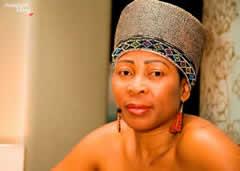
By Njabulo S. Ndebele
Nokugcina Elsie Mhlophe was born on 24 October 1958 in Hammarsdale to a Xhosa mother and Zulu father. She matriculated at the Mfundisweni High School in the Transkei in 1979 and briefly worked as a housemaid in Johannesburg before beginning as a cadet journalist at Rhodes University. After a brief course in filmmaking she started as a newsreader for the Press Trust, BBC Radios Africa Service and ZBC.
Mhlophe went on to establish herself as a multi-talented multilingual actor and activist, poet and playwright, composer and director, infusing storytelling with poetry. Widely translated into all of South Africas official languages as well as internationally, Mhlophe has received a terrific array of prizes and awards. READ MORE
Snow is Falling, Written Snow is Falling
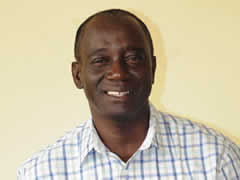
By Oumar Farouk Sesay
When the inherent insanity of war was unleashed in my country Sierra Leone in 1991, it took away so many things along its path; lives, limbs, properties, integrity, neighborhoods and neighborliness. It stripped the beacons of values and maimed the language rendering it inept in appropriating the enormity of war. It seemed the language was paralyzed by the grotesque; the syntax, semantics, morphology and metaphors develop centuries ago lack the capacity to accommodate the new ugliness. The numbing of the soul took its toll; the victims of our war were stunned, unable to speak the unspeakable. They hoisted a look of hollowness on their faces that told a tale of doom. READ
“I Still Belong to My Country”:
An Interview with Ali Al Jallawi
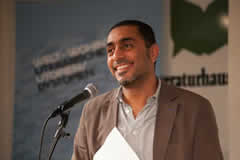
By Ayesha Saldanha
Poet Ali Al Jallawi fled Bahrain in April of this year, one of many political activists, journalists, and writers who left the country rather than risk arrest during a crackdown against pro-democracy protests. In the 1990s Al Jallawi had been imprisoned twice, and tortured, as described in his memoir God After Ten O'Clock. He was active in the recent movement for democratic reforms, and had recited a poem at the Pearl Roundabout, the center of the pro-democracy demonstrations. After his picture appeared on Web sites naming "traitors," and the security forces visited his parents' home, he decided to leave the country. He spent months moving from one country to another, but is now living in Germany. I asked Ali Al Jallawi about his experience of exile so far. READ
Snow is Falling, Written Snow is Falling
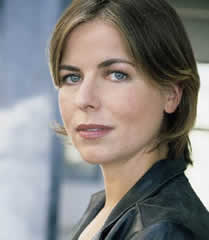
By Maria Barnas
The poet looks at a wall. On his desk a working surface that should offer access to the wide world and all the unbridled fantasy that lies behind it, or should I say 'within' or 'above' it, for who knows in what way fantasy moves itself stands the wall, angular and irrefutable.
From my room, I look out at a wall. There is a tree between me and the wall. The stone wall reminds me that everything that I see, everything that I think, is a projection. The wall lets this happen. The wall is a surface on which I project everything I write: the window, the tree, the city of Berlin, which I know lies behind those stones; the city of Amsterdam, which I also suspect lies there. It is snowing in these cities. I see the snow falling. READ
The Importance Of Realıty In Turkısh Poetry
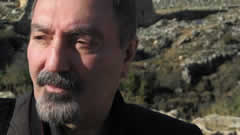
By Metin Cengiz
Translated by Övünç CENGİZ
It would not be a grave mistake to argue that that which is real occupy a great place both in modern Turkish poetry and in Divan 1 and Folk 2 poetry. As a matter of fact, when reading Divan poetry one can even come to an understanding of the concept of life prevailed at that era. At this point we should hear Sabri Ülgener:3
For a long time Divan Literature considered to be limited with blindly repeating stereotypical and ascetic symbols and expressions or images familiar from Persian literature which have nothing to do with the daily life of society; yet with this study we will find that Divan Literature has a quite different face: It is a genuine and invaluable source of information! READ
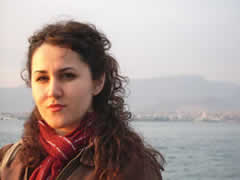
By Müesser Yeniay Translated by Övünç CENGİZ
Defence of Poesie is the first real English critism. It is written in a singularly atrractive style, witty and persuasive, and modelled on a classical oration in reply to Stephen Gasson’s School of Abuse which is dedicated to Sidney himself and which attacked poets, pipers, players, jesters, and such like caterpillars of a commonwealth. I think, poesy does not need to be defended for it has already a shell but rather should be praised. Poetry is strokes of humans in an unexplored sea inside him. It is discovery of both new senses and new objects. Art as the sole domination of humans, and the last reign. READ
In Search of Poem’s Future Role and Image
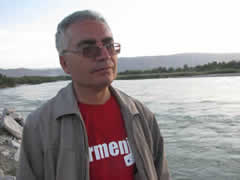
By Hrant Alexanyan
Translated by Övünç CENGİZ
In its full sense the poem’s mission has remained the same for all times, just on its further way it becomes more complicated and hard workable. The poetry is going to face a series of severe competitions with other branches of art, it has to maintain not only its leading position among the other literary genres but also to be visible and demanded in the circle of other types of art and media, especially of internet. I’m sure that the tomorrow’s poetry with its principal manifestations, literary high and emphasized qualities will need to include also factual, significant information and interpretations which is urgently necessary for the 21st century man. READ
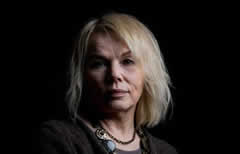
By Synnøve Persen
My Home is in my Heart
(Nils Aslak Valkeapää)
The Sami language is one of the small languages in the world. It belongs to the Finno-Ugric family, related to Finn, Hungarian, Estonian and some smaller languages in Russia.
Sami has four distinct language groupings - the biggest one is the Northern Sami to which I belong, then the Southern, the Anar and the Skolt dialect. It is estimated to be spoken by up to 20,000 people, but written and read by considerably fewer, due to the politics from the nordic states throughout long time, until 1950, Sami language and culture were virtually ignored by the Scandinavian educational systems. Language teaching was not introduced into schools until 1960 and then upon an experimental basis. READ
Published at November 17th, 2013.
Updated at May 8th, 2014

